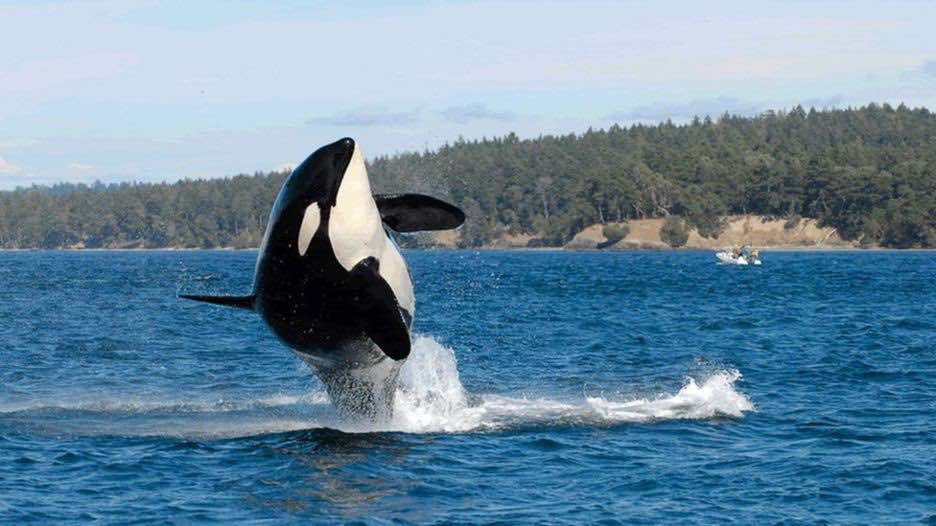forum
library
tutorial
contact

Endangered Orcas are Losing Babies at
Unprecedented Rates … and It's Our Fault
by Michelle Neff
One Green Planet, September 1, 2017
|
the film forum library tutorial contact |

|
Endangered Orcas are Losing Babies at
by Michelle Neff
|
To make matters worse, Southern Resident killer whales are endangered, with only 78 whales left and only 30 females.
"This study further underscores that Southern Residents are starving and that they're careening towards extinction,"
-- Oceana Pacific's senior scientist Ben Enticknap said.
 Humans are consuming our planet's resources at an alarming rate. Some of our consumption is to satisfy a desire for a particular food and the repercussions of these actions are often shocking. Many people who decide to begin eating more responsibly, continue to eat fish or other sea animals. Unfortunately, fisheries and aquaculture are wreaking havoc on the oceans. According to Overfishing.org, "On a global scale, we have enough fishing capacity to cover at least four Earth like planets." Basically, we're fishing like we have three additional planets stocked with seafood, just for us. Not okay.
Humans are consuming our planet's resources at an alarming rate. Some of our consumption is to satisfy a desire for a particular food and the repercussions of these actions are often shocking. Many people who decide to begin eating more responsibly, continue to eat fish or other sea animals. Unfortunately, fisheries and aquaculture are wreaking havoc on the oceans. According to Overfishing.org, "On a global scale, we have enough fishing capacity to cover at least four Earth like planets." Basically, we're fishing like we have three additional planets stocked with seafood, just for us. Not okay.
And now there is yet another consequence of overfishing: endangered orcas are miscarrying because they are starving. In a recent study in the PLOS ONE Journal, scientists found that 69 percent of Southern Resident killer whale pregnancies end in failure. The whales almost exclusively feed on Chinook salmon, but now the salmon is hard to find, all because of you guessed it … human interference.
For mammals, spontaneous abortion becomes rare as pregnancy progresses, but this isn't the case for Southern Residents. "Out of the 69 percent that aborted, about a third of those were in late pregnancy. That's a period that's extremely costly to females. It's a pretty serious problem," lead author of the study, Samuel Wasser told Oceana, an organization dedicated to protecting the world's oceans. Not only are the whales unable to find food, they are ingesting pollutants like DDT and flame retardants and when they burn their blubber stores to survive, the blubber releases stored toxins and causes high miscarriage rates.
Worryingly the Chinook salmon are also an endangered species, and there are simply not enough of them to feed the South Resident Killer Whales, which are relying on a plentiful population of salmon to recover their own species.
Overfishing is one of the biggest threats to our planet. Entire species have been nearly obliterated by the demand for seafood, with experts estimating that nearly 80 percent of the world's fish stocks have been fully exploited or are in decline and that 90 percent of the ocean's large predatory fish have been wiped out. If current trends continue, the Earth's food fisheries are likely to collapse entirely by the year 2050. These drastic depletions are causing harrowing effects to the ocean's delicate food chains and ecosystems.
According to Southern Resident Killer Whale Salmon Initiative, there are four lower Snake River dams which are having a devastating impact on the salmon population. Snack River is a major waterway in the Pacific Northwest that spans all the way from Wyoming to Washington State which serves as a critical habitat for Chinook salmon.
The federal government has spent billions of dollars on habitat restoration measures, but it seems this is greenwashing to avoid any meaningful efforts in the form of significant changes to dam operations. Billions of dollars are being wasted to avoid tackling the source of the problem that is threatening the very survival of Southern Resident Killer Whales – which also support a multimillion-dollar tourist economy in the local area.
But there is hope. A partnership formed by government officials, farmers, tribes, fishers, and environmental organizations, including Oceana, has developed recovery goals for the salmon over the next two years. There is also a growing campaign in support to breach the dams. A petition on Change.org has been signed by over eleven thousand people calling on Congress to authorize the removal of the four lower Snake River dams.
Please share this article far and wide to help educate others. We must do all we can to protect the Southern Resident killer whales before it's too late!
Related Pages:
Fate of Pacific Northwest Orcas Tied to Having Enough Columbia River Salmon by Rocky Barker & Brittany Peterson
Idaho Statesman, 7/9/17
learn more on topics covered in the film
see the video
read the script
learn the songs
discussion forum
